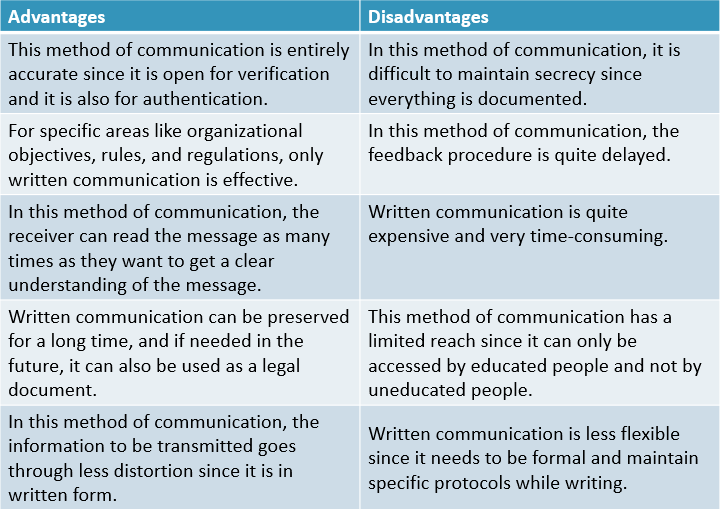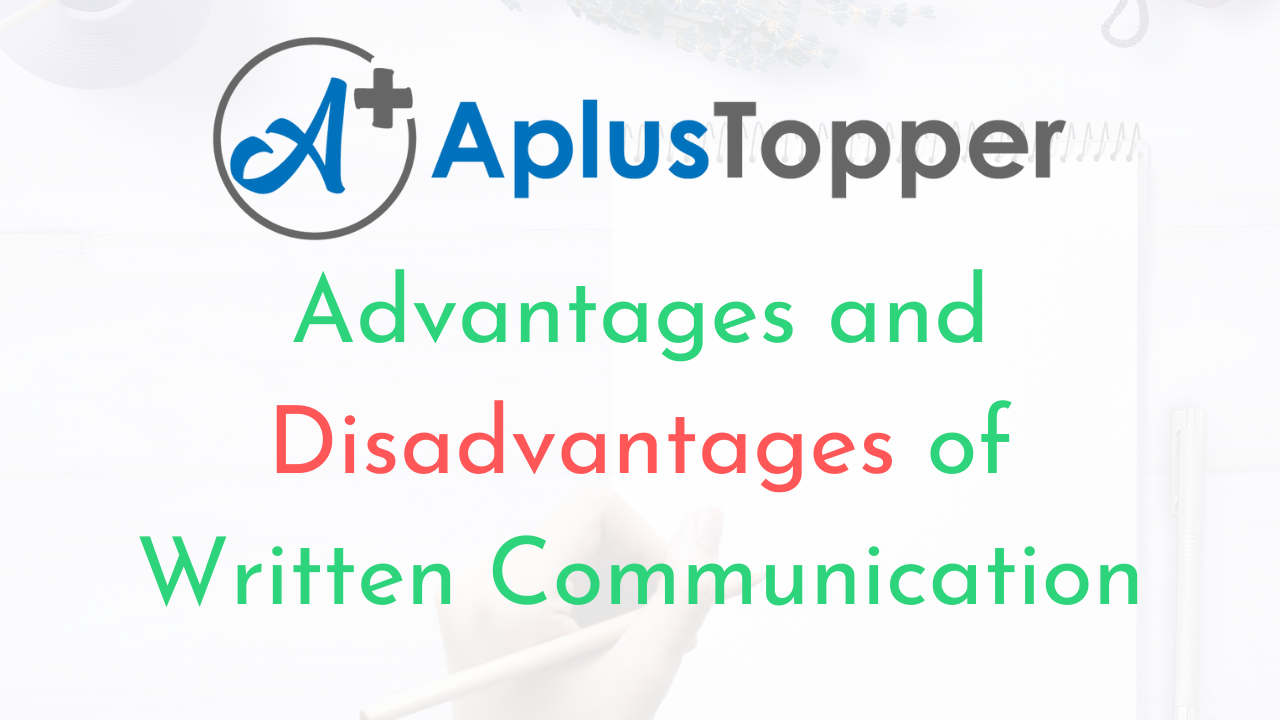Written Communication Advantages and Disadvantages: The term communication is procured from the Latin word called ‘communicate,’ which means to share. It is the key to any venture that involves more than one individual. Communicating through writing is becoming vital in today’s world as this age is known as the age of information. The writing was introduced in our world after speech yet, writing in a certain way is more formal and unique when compared to speech. In business, the most popular and common method of communication is Written communication. This communication is essential for small business managers and owners as it helps them develop beneficial written communication skills.
- Advantages of written communication
- Disadvantages of written communication
- Comparison Table for Advantages and Disadvantages of written communication
- FAQs on Pros and Cons of written communication
What is Written Communication? Advantages and Disadvantages of Written Communication 2021
Written communication is sending written messages, written orders, and written instructions over circulars, reports, letters, emails, telegrams, bulletins, manuals, etc. This method of Importance of communication is very formal and less flexible. It is mainly used when the information is lengthy and contains complex terms which are difficult to explain verbally. These written documents can also be used in the future as legal evidence, and hence they should be appropriately preserved.
Students can also find more Advantages and Disadvantages articles on events, persons, sports, technology, and many more.
For effectiveness in written communication Essay, the writing should be complete, clear, concise, and correct. Written communication comprises an arrangement of words in proper order, choosing words carefully, and cohesive sentence composition.
Characteristics of Written Communication
Some of the characteristics of written communication are:
- It is the most formal type of communication.
- It is mainly used for documentation. It is a permanent record of the organization.
- Written communication is also used to circulate information in the business
- It is cliched since it has to maintain grammatical rules and also has to follow writing patterns.
- It does not require the attendance of the sender and the receiver together for the process.
- It is a time-consuming process since formulating and sending the message requires quite a lot of time.
- It is a simple process and does not require a lot of steps. Formulating, sending, and receiving the message are the primary few steps of this method of communication.
- It is an activity that is quite creative and also requires a ton of imagination and effort.
Advantages of Written Communication
- Accuracy: Written communication is very accurate. The writer needs to be very precise. They need to think about their ideas and then properly arrange them carefully. The written communication is formulated with utmost care. It is open for verification, and it is also checked for authentication. Hence, mistakes are usually not found.
- Broad applicability: Organizational policies, missions, rules and regulations, objectives, production methods, etc., are always available in written form. For these specific areas, except written communication, no other way of communication is effective. For these areas, written communication plays a vital role since other methods of communication are not entirely valid.
- Less distortion: While transmitting a message verbally, i.e., using oral communication, some parts of the speech may get altered or removed. This may affect the importance of the information. However, if written communication is used, then the level of distortion is relatively low since the information is in written form.
- Clear understanding: Written communication helps the receiver to understand the meaning of the information clearly. In this method, the receiver can re-read the information until they understand it correctly. Hence, this method of communication provides clarification for the user since they can read the message again and again if they fail to understand the meaning the first time.
- Permanent record: Unlike oral communication, written communication can be preserved for a long time, and thus it acts as a permanent record for the business or the organization. This information can be beneficial in the future as it can also be used as legal documents.

Disadvantages of Written Communication
- Secrecy: In oral communication, the confidentiality of communication between two parties can be adequately maintained. However, in the method of written communication, maintenance of privacy is quite tricky. This is because, in written communication, the document is in written format, and as a result, it can be discovered by anyone, breaching the secrecy between the two parties.
- Costly and slow process: The method of written communication is slow and expensive. Articulating a written message is quite costly since for preparation and sending of the statement, many people’s hard work is required, and they need to be paid accordingly. It is also a slow process since it takes a long time to reach the desired location.
- Feedback is delayed: In written communication, the feedback procedure is quite delayed. It fails to produce instant and quick feedbacks since the user first needs to receive the message and then go through it before giving feedback. In certain events, the message may be delivered after a long time which will further delay feedback.
- Limited accessibility: Written communication can only be accessed by educated people to read the written messages and documents. The uneducated or illiterate people are unable to access this method of communication, and hence its reach is limited to only a particular group of people.
- Flexibility: Written communication needs to maintain specific protocols for writing the desired document. It also needs to be quite formal, and hence it is not very flexible. After the writing of the document, no adjustments can be made to it. This also reduces the flexibility of this method of communication. It is also not possible to build a personal relationship with the receiver through written communication. Since direct communication among the parties is not possible, it becomes difficult at times to understand the exact requirements of the receiver.
Comparison Table for Advantages and Disadvantages of Written Communication
| Advantages | Disadvantages |
| This method of communication is entirely accurate since it is open for verification and it is also for authentication. | In this method of communication, it is difficult to maintain secrecy since everything is documented. |
| For specific areas like organizational objectives, rules, and regulations, only written communication is effective. | In this method of communication, the feedback procedure is quite delayed. |
| In this method of communication, the receiver can read the message as many times as they want to get a clear understanding of the message. | Written communication is quite expensive and very time-consuming. |
| Written communication can be preserved for a long time, and if needed in the future, it can also be used as a legal document. | This method of communication has a limited reach since it can only be accessed by educated people and not by uneducated people. |
| In this method of communication, the information to be transmitted goes through less distortion since it is in written form. | Written communication is less flexible since it needs to be formal and maintain specific protocols while writing. |

FAQ’s on Pros and Cons of Written Communication
Question 1.
For management purposes, what are some of the mediums of written communication?
Answer:
For management purposes, some of the mediums of written communication are:
- Management copy
- Handbook
- Publications
- News copy for the management
- Special bulletin for the management
Question 2.
Why should one use written communication?
Answer:
There are multiple reasons for using written communication. Some of them are
- It covers complex information easily
- A written document is easier to verify
- Individuals can keep it as a permanent record and also can be used as a legal document.
- It provides delegation of authority
Question 3.
What is an office memo?
Answer:
Memos, also known as memorandums, are short notes in which the exchange of information of the organization takes place. The data is usually exchanged by superiors and subordinates or superiors and superiors or employees of the same position.
